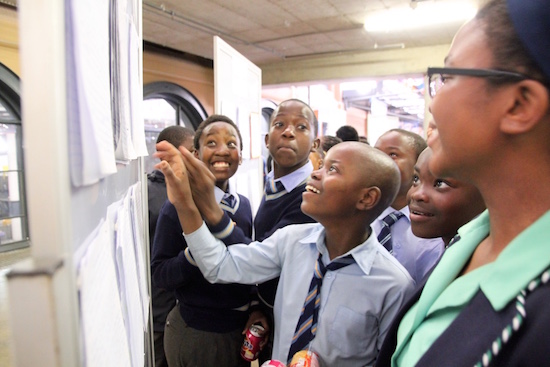

 |
| Students read articles displayed for the China in My Eyes Essay Contest at the Sci-Bono Discovery Centre in Johannesburg. (Picture: People’s Daily Online / Zhang Jiexian) |
“Down the street I live on, there is a Chinese store. They sell clothes and I always buy most of my clothes there. Over the past few years, I have formed a beautiful friendship with the owners of the shop. They are kind and wonderful people. It just made me wish all South Africans were like that ...” — AtlehangMokoela, HTS Carel de Wet
“Many things are made by Chinese eg toys, phones, buildings, clothes and furniture. I used to use this phone called Huawei. And at school they have tablets called Huawei ...” — MantlaneMitchelleMashapa, Sekwati Primary School
Among the 300 students from 24 Gauteng Department of Education (GDE) schools in SA who participated in the China in My Eyes essay contest, more than 100 received prizes in late October at the Sci-Bono Discovery Centre in Johannesburg.
Earlier this year, the South African government initiated plans to introduce Mandarin Chinese to public schools as a second language in 2016. The announcement immediately sparked public debate.
Fortunately, since it’s not compulsory, learners simply have a choice to decide whether they are going to pick up Mandarin or not.
About 14 GDE schools, collaborating with the Chinese Culture and International Education Exchange Center (CCIEEC), have already started teaching Chinese. As Dr Lu Zhilei from CCIEEC revealed: “The schools where they teach Mandarin have achieved outstanding results in this contest. Language is a bridge that helps you understand other countries and cultures that you are totally unfamiliar with,” said Lu at the award ceremony. “Through this bridge, you are able to experience a broader world that you never knew before.”
China has 1.3-billion people, 56 ethnic groups and a history dating back some 5,000 years. Some of the students wrote about the country’s history and customs, some highlighted China’s current development, while others told stories involving exchanges between people from the two countries. Although only some of the students had visited China before, they were able to write thoughtful essays through research and their daily observations. Some also expressed their willingness to visit China in the near future and to witness for themselves what they had only read about in newspapers and magazines.
As Albert Chanee, a deputy director general with the GDE, said: “The department has developed a close relationship with China, strengthening language education, promoting cultural exchange between teachers and learners, as well as enhancing education on Maths and Science.”
Li Song, Charge d’Affaires of the Chinese Embassy in SA, shared how he saw China at the award ceremony. “My home country is both ancient and modern with amazing changes and progress happening every day.
“She not only has historical sites like the Great Wall, but also a lot of modern cities. She has economically developed areas in the eastern coastal regions as well as relatively poor and backward rural areas in the central and western regions. She enjoys rapid social and economic development while also facing tough issues like pollution, ” Li said.
Li invited all the winners to visit China in the future. “So that one day you can see this great nation with your own eyes, make more Chinese friends and become envoys of friendship between our two nations in future.”
(The story was originally published on Business Day on December 2nd, 2015.)
 |
 The evolution of J-10 fighter
The evolution of J-10 fighter Top 10 Asian beauties in 2016
Top 10 Asian beauties in 2016 Train rides through blossoms
Train rides through blossoms HD pictures of battleships of PLA Navy
HD pictures of battleships of PLA Navy East Sea Fleet conducts combat drills
East Sea Fleet conducts combat drills Sophie Marceau goes square dancing in Guangzhou
Sophie Marceau goes square dancing in Guangzhou Police officers learn Wing Chun in E. China
Police officers learn Wing Chun in E. China Charming models compete in super model contest in Beijing
Charming models compete in super model contest in Beijing Beauties wearing Tang dynasty costume pick tea leaves
Beauties wearing Tang dynasty costume pick tea leaves Top 20 hottest women in the world in 2014
Top 20 hottest women in the world in 2014 Top 10 hardest languages to learn
Top 10 hardest languages to learn 10 Chinese female stars with most beautiful faces
10 Chinese female stars with most beautiful faces China’s Top 10 Unique Bridges, Highways and Roads
China’s Top 10 Unique Bridges, Highways and Roads My tiger mother controlled me with Chinese food
My tiger mother controlled me with Chinese food Shanghai court finds against maternity tourism company
Shanghai court finds against maternity tourism company Pranks under fire after video of celeb wedding shows actress harassment
Pranks under fire after video of celeb wedding shows actress harassment For foreigners, Chinese talent and reality shows offer a chance to hit it big
For foreigners, Chinese talent and reality shows offer a chance to hit it bigDay|Week